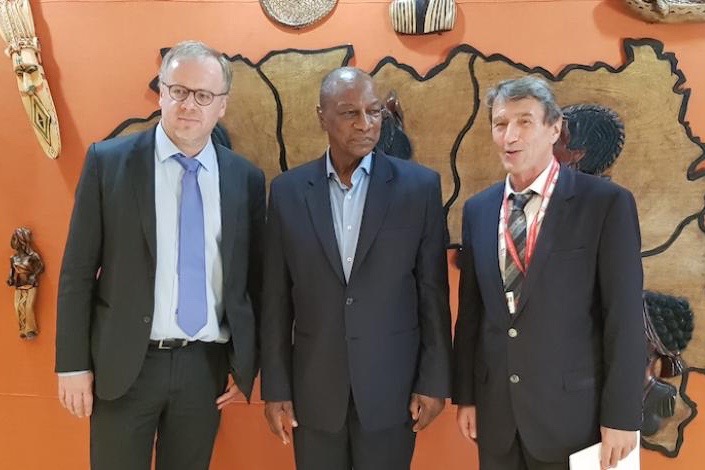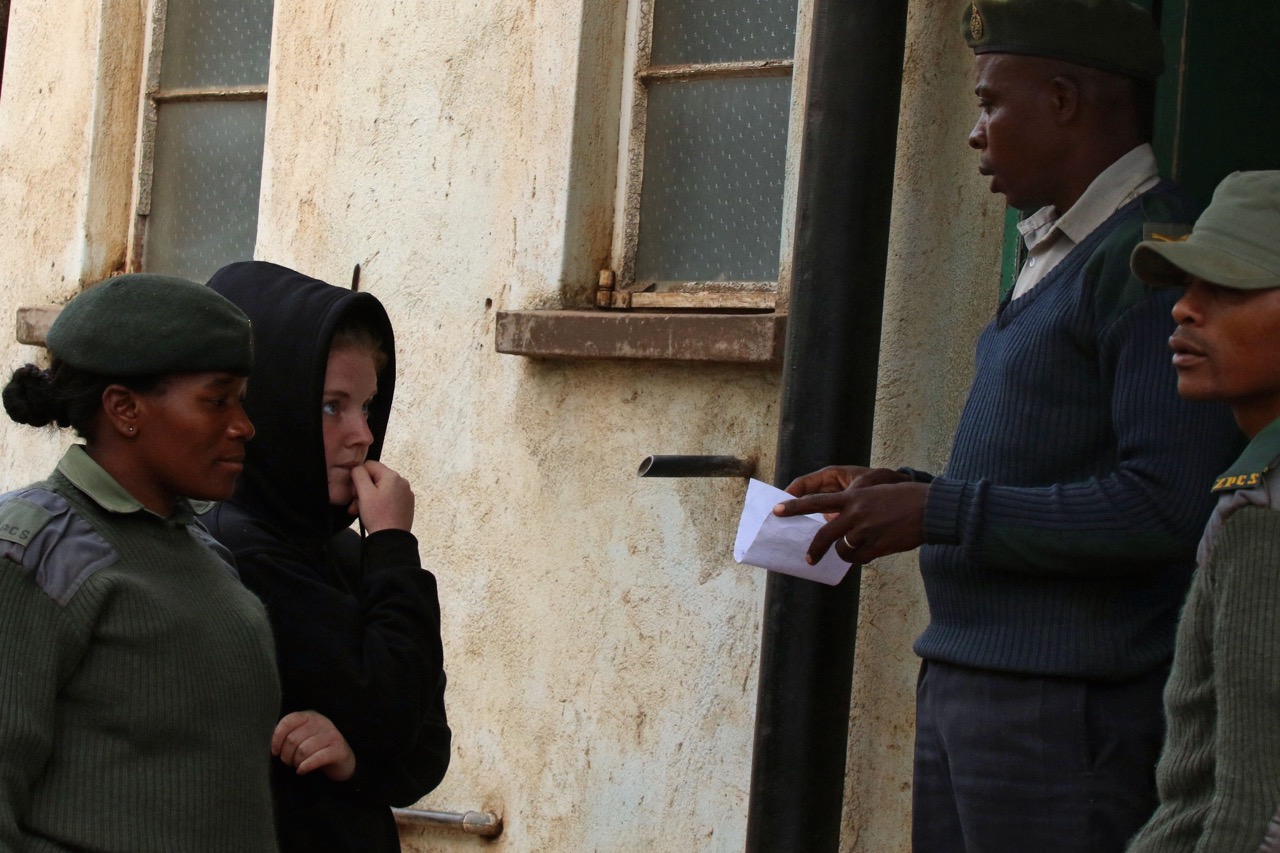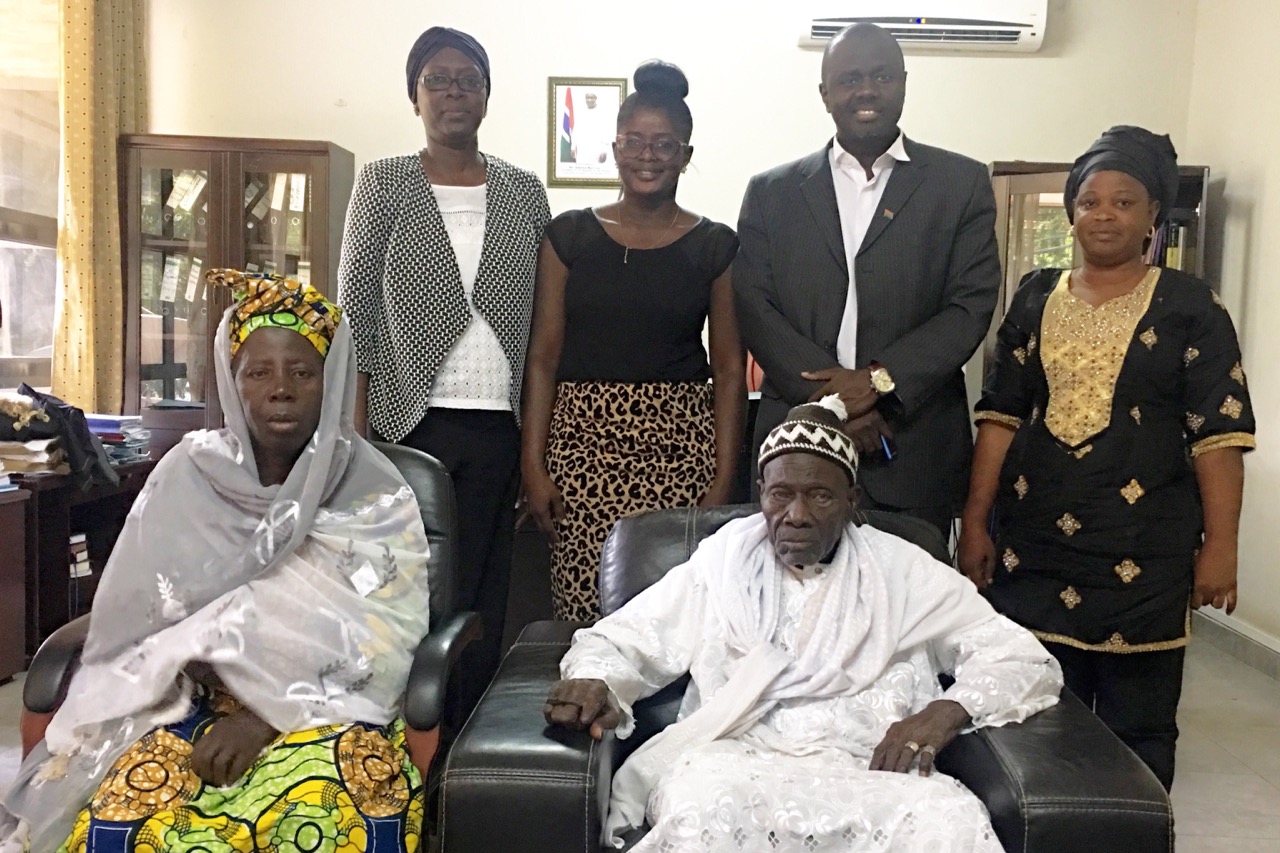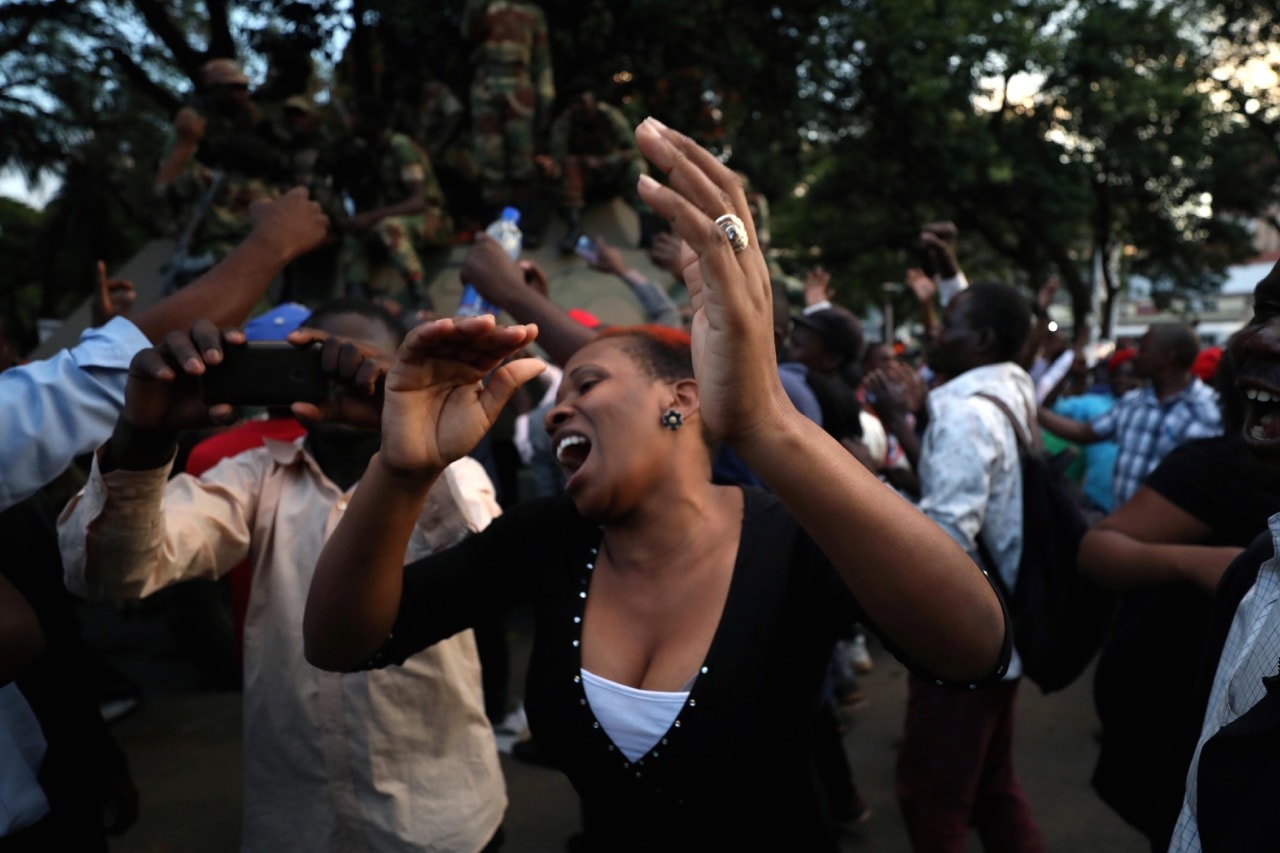Major strides towards fighting impunity in The Gambia, US journalist Martha O'Donovan charged with subversion in Zimbabwe as Mugabe resigns, Guinea's clampdown on free expression, and more in our November roundup of free expression issues in Africa.
Quashing rebellions and silencing secrets
The Guinean government spent a good part of November repressing free expression.
Speaking at the International Union of the Francophone Press meeting in Conakry, Guinea on 25 November 2017, President Alpha Condé described a national teachers’ strike as “a rebellion”, according to The Media Foundation for West Africa (MFWA).
Condé then added that if media outlets report statements made by Aboubacar Soumah – a teachers’ union leader who called for the strike – they would be considered “accomplices” and taken off the air.
The MFWA has expressed concern over Condé’s threat, describing it as “a frontal attack on press freedom.”
The organisation has good reason to be worried.
On 2 November 2017, Guinea’s media regulator – the Haute autorité de la Communication (HAC) – suspended Radio Espace and its country affiliates for seven days, following on-air comments made by journalist Moussa Moise Sylla.
Sylla had said that Guinea’s military garrisons are crumbling, and urged authorities to provide psychological care to soldiers who had returned home from peacekeeping missions.
The HAC said that his comments were “liable to undermine national security, the morale of the armed forces and public order.”
Sylla was subsequently charged with “divulging military secrets.” He is scheduled to appear in court on 25 December.
The MFWA has denounced the charge, noting that the journalist’s observations are “valid for military institutions in much of Africa, and cannot, therefore, be a security-threatening revelation as the public prosecutor is claiming.”
Reporters without Borders (RSF) secretary-general Christophe Deloire has been equally vocal about Condé’s recent treatment of the press.
At the International Union of the Francophone Press meeting on 25 November, Deloire said: “Mr. President, we appeal to you today in a constructive spirit not to make comments amounting to intimidation, which don’t constitute a policy.” Deloire added “As an African proverb might say, you don’t burn the savannah because there are weeds. Quality journalism is a legitimate aspiration, but the media should not be undermined in an attempt to achieve it.”
Preventing paediatric HIV through access to information
Irene Nkosi believes that access to information can save lives. And she’s right.
Through her work with mothers2mothers (m2m) in South Africa, Nkosi supports HIV-positive pregnant women in obtaining information and resources to help them sure their children are born HIV-negative.
The cause is near and dear to her heart; Nkosi found out she was HIV-positive in her teens, while she was pregnant with her second child. The stigma she faced from her family was fierce. “After I told my family, they started to treat me like a dog,” Nkosi told IOL. “I built a ‘doghouse’ outside the main house for [myself] so that I do not infect anyone.”
But Nkosi’s life changed in 2008 when she was referred to m2m, and found out she was not alone. She then began to work with the organisation as a Mother Mentor – a frontline worker who provides essential health education and support to women on how they can protect their babies from HIV infection.
On 2 November 2017, People magazine recognised Nkosi as one of “25 Women Changing the World.” The Pretoria-based activist was featured alongside well-known celebrities such as wildlife activist Jane Goodall and singer Demi Lovato.
“When I now talk to other HIV-positive pregnant women, I’m talking about something I’ve gone through, not something I’ve read about in a book,” Nkosi told Huffington Post South Africa. She said that education about mother-to-child HIV transmission is necessary because “many women in our communities are still not fully informed.”
Martha vs. Mugabe
On 21 November, the globe watched in awe as the world’s oldest president resigned.
Members of Parliament danced, citizens paraded through the streets and the sounds of cars honking could be heard all through Harare, Zimbabwe.
Robert Mugabe – infamous for a 37-year rule marked by high poverty rates, corruption, and repression – was finally stepping down.
But for some Zimbabweans the celebrations had an ominous undertone to them, as they continued to grapple with the legacy of censorship left behind by the Mugabe era.
Just three weeks before Mugabe’s resignation, 25-year-old US citizen Martha O’Donovan was detained in Harare on charges of subversion and undermining authority. The charges – which could lead to over 20 years in prison – were brought forth after O’Donovan was accused of tweeting that Mugabe was “a selfish and sick man.” The tweet was allegedly accompanied by an image of Mugabe with a catheter, Al Jazeera reports.
O’Donovan – who works as a program associate for satirical online channel Magamba TV – has called the charges “baseless and malicious.” Her arrest spurred international outcry, and prompted the hashtags #FreeMartha and #ArrestUsAll.
The media activist was granted bail from the the maximum-security Chikurubi prison on 9 November, but the charges against her remain.
On the day of O’Donovan’s release, Amnesty International Zimbabwe’s Executive Director, Cousin Ziala stated: “While we welcome the decision to release her, the absurd charges against Martha O’Donovan clearly don’t stand up to scrutiny and must be dropped. We fear she will not be the last to be swept up in the clampdown on social media platforms.
O’Donovan’s detention comes less than a month after former finance minister Patrick Chinamasa was commissioned to lead the Ministry of Cyber Security, Threat Detection, and Mitigation, who Zimbabweans soon began referring to as the “Minister of WhatsApp.”
In October, the Media Institute of Southern Africa-Zimbabwe said that Minister Chinamasa’s threats to tighten control over social media had “chilling effects on the use of social media by the citizenry.”
Ugandan government represses “Red Pepper”
“Charging journalists with endangering security because of an article? Sending anti-terrorist police to a newspaper? What is the Museveni government afraid of?” These are just some of the questions that RSF had about the Ugandan government’s recent clampdown on Red Pepper newspaper.
On 21 November, eight senior employees of the popular tabloid paper were arrested as police conducted an anti-terrorist raid on their offices in Kampala.
The arrests were prompted by a Red Pepper article published the day before, which claimed that Ugandan president Yoweri Museveni was plotting against Rwandan president Paul Kagame.
Five of Red Pepper’s directors and three of its editors were taken to Nalufenya Detention Centre. A week later, the Buganda Road Court charged them with seven counts, including publication of information prejudicial to national security, libel and offensive communication.
Human Rights Network for Journalists -Uganda has condemned the charges and arrests. On 27 November, HRNJ-Uganda National Coordinator Robert Ssempala stated: “We believe that the decision by court to deny the suspects bail after a week-long detention at Nalufenya was subjecting them to further […] abuse. We call on the State to let work resume at the Red Pepper as the court case is going on.”
The editors and directors are due to appear in court on 5 December.
Media excellence in West Africa, a win for FOI, and #FreeNseRamon
Media Rights Agenda-Nigeria (MRA) celebrated a legal victory this month that has been lauded as a “victory for transparency” by Premium Times newspaper. On 28 November, a Lagos High Court ruled that Nigeria’s Freedom of Information (FOI) Act, 2011, “is applicable to the Government of Lagos State and does not require ‘domestication’ by the State to have effect.”
The ruling came as a result of a suit launched by MRA against the Lagos State Ministry of Health and the Lagos State Government over its failure to disclose records and information requested under the FOI Act.
Victory for transparency as court rules FOI law applicable to Lagos govt https://t.co/Z4Wo5eX1ti pic.twitter.com/FiGrIyM7y9
— Premium Times (@PremiumTimesng) November 29, 2017
The Africa Freedom of Information Centre (AFIC) also had a lot to celebrate last month. On 2 November, the Ugandan government gave AFIC an award in recognition of the organisation’s dedication to open contracting.
Since 2011, AFIC has worked with private, public and civil society groups to promote the enhancement of disclosure in all stages of public contracting. In a tweet, Gilbert Sendugwa, head of the AFIC Secretariat, referred to the award as “very humbling.”
Very humbling. Uganda Govt awards @AFIC1 4 outstanding contribution to #opencontracting @Twaweza_NiSisi @UCMC2 pic.twitter.com/1GN6u6EhNo
— Gilbert Sendugwa (@GilbertSendugwa) November 2, 2017
The MFWA also began November on a high note after hosting the inaugural West Africa Media Excellence Awards (WAMECA) in Accra, Ghana. From 28-30 October 2017, WAMECA brought together media experts, activists and editors from across West Africa, as well as government representatives, development partners and members of the diplomatic community. Awards recognising journalism excellence on numerous topics were presented; these included reporting on women’s rights, the UN Sustainable Development Goals (SDGs), anti-corruption and more.
Another award was granted in November for excellent journalism, but the mood surrounding the recognition was more sombre, and for good reason.
On 4 November 2017, Cartoonists Rights Network International granted cartoonist and activist Ramón Esono Ebalé the CRNI Award for Courage in Editorial Cartooning, in absentia. Ebalé was arbitrarily detained on 16 September in Equatorial Guinea; he has not been released or charged since. Ebalé’s cartoons are widely recognized as being critical of President Teodoro Obiang and other government officials. You can join a twitter campaign calling for his immediate and unconditional release by using and following the #FreeNseRamon hashtag.
Fighting impunity in The Gambia, DRC and Nigeria
Major strides against injustice in The Gambia were made last month as free expression defenders around the globe commemorated the International Day to End Impunity for Crimes Against Journalists.
According to the MFWA, two senior government officials revealed that the Gambian government will comply with the rulings of the ECOWAS Court in the cases of murdered editor Deyda Hydara, disappeared reporter Chief Ebrima Manneh and tortured journalist Musa Saidykhan.
The decision was announced on 2 November, at a forum held by the MFWA in collaboration with the Gambia Press Union (GPU).
A few days later, the MFWA and the GPU facilitated meetings between Ministry of Justice officials and families of the victims to discuss how they would proceed with providing compensation to the families.
In the Democratic Republic of Congo (DRC), IFEX member Journaliste en Danger (JED) commemorated the International Day to End Impunity for Crimes Against Journalists by releasing their annual report on the state of free expression the DRC.
The 2017 report documents 121 cases of attacks on media workers; half of which were instances of physical violence. The report further extrapolates on the political context within which journalists must work. DRC is undergoing a political crisis; presidential elections were scheduled to occur in November 2016 and when Kabila refused to step down, an agreement was reached that he would resign by the end of 2017. This has yet to occur.
Protests by civilians calling for Kabila to comply have been met with force all over the country. Human Rights Watch reports that in November, 15-year-old secondary school student Binja Happy Yalala was beaten by police and detained for over 10 hours on Idjwi Island. The girl had participated in a peaceful march organized by the citizens’ movement “C’en Est Trop” (“This is Too Much”), but was accused of being a sorcerer.
In Nigeria, free expression was silenced in a much more final way. On 15 November, journalist Ikechukwu Onubogu was found dead, with bullet wounds in his body, after having been missing for three days. Onubogu had worked as a cameraman with the Anambra Broadcasting Service (ABS) in Awka, the state capital, according to the MFWA.
This incident brings to three the number of journalists murdered by unknown attackers in Nigeria since the beginning of the year.
In a press statement marking the International Day to End Impunity for Crimes against Journalists, the International Press Centre, (IPC Lagos-Nigeria) “called on the police authorities to make [a] public disclosure [of] what has been done so far towards unraveling the mystery behind killed journalists in Nigeria.”

RSF secretary-general Christophe Deloire (far left) and Jean Kouchner, president of the Francophone Press Union (right) met with Guinean president Alpha Condé on 25 November 2017Reporters without Borders

South African activist Irene Nkosi was recently featured as one of People Magazine’s “25 Women Changing the World”mothers2mothers

US citizen Martha O’Donovan is released on bail at Chikurubi Maximum Prison in Harare, Zimbabwe, 10 November 2017REUTERS/Philimon Bulawayo

The parents of disappeared reporter Chief Ebrima Manneh (seated) are photographed with the MFWA and GPU’s mediation teamMFWA/GPU



